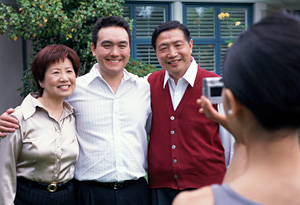I often end up being the caregiver in relationships.
"I've fallen in love with the most handsome man, and I want you to help me not turn into his mother," said Stella, a 36-year-old human resources director of a global company. Stella had had two previous long-term relationships. "Each time the big, strong man became a little, helpless boy," Stella said. "And the gorgeous, sexy woman [i.e., Stella] ended up in employment as a full-time carer." This was Stella's first serious relationship for six years and she didn't want to fall into a role again.
Roles in romantic relationships are usually a projection of roles first forged in childhood. When I asked Stella who was the martyr in her family, Stella replied quickly, "My mother, big time." If a family has one martyr in it, then unhealthy sacrifice is something everyone will have to deal with. Classically, everyone in the family tries to heal the martyr, and they usually end up in unhealthy sacrifice trying to do so. The authentic, unconditioned self is lost as you take on the job/role of being the helper, the good child, the peacemaker, the healer, the responsible one, the grown-up one, the hard worker, the strong one, the invisible one and the martyr.
Letting Go Exercise: Take a look at your family. Identify the roles everyone played when you were growing up, including you. Notice if you still play these roles in romance, with friends, in work and on your spiritual journey. Notice what this costs you. Playing a role leaves you feeling like a cardboard cutout of your real self. You feel flat and lifeless. You try to be positive, but really you feel removed, unappreciated and resentful. Remember this: Roles are self-appointed. No one said you must take on this role. If you are in a role, there must be a better way. It's time to make a new choice.
I am afraid of giving too much in relationships.
"I've met a new girl, and I think this time she could be the one," said Dan, a 34-year-old firefighter based in New York.
"You don't sound very happy," I said.
"I am very happy," Dan replied. "I'm also very scared."
"Why?" I asked.
"Because every time I commit to a girl, I end up giving too much," Dan said.
"Is that really true?" I asked.
"It feels true," Dan replied.
"Is the problem that you give too much, or is it that you give yourself away?" I asked.
The unhealthy sacrifices you have made in the past can, it not healed, put you off relationships for life. Or they can put you off taking the next step in commitment and intimacy in your current relationship. When you are in love, you recognize that love wants to give everything, totally, and there is no feeling of loss. However, when you are in unhealthy sacrifice, giving always feels like loss. Why is this? Well, partly it is because unhealthy sacrifice is an attempt to give without receiving. Also, unhealthy sacrifice is a covert operation of "giving in order to get" (e.g., "If I give myself away to you, you will keep me, wont you?").
Letting Go Exercise: When you play the role of the "giver," you usually also end up playing "the loser." Inevitably, your relationships end up feeling one-sided. People seem to take more than they give. Your relationships seem to take a lot out of you. The first step in letting go of the role of "giver" is to inspect the role more closely. You may find, for instance, that "giving too much" hides feelings of unworthiness, a desire to please, a fear of rejection, wanting to be the one in control, a reluctance to receive and a lack of authentic presence and openness on your part.
Next: Are you good at asking for what you want?



















